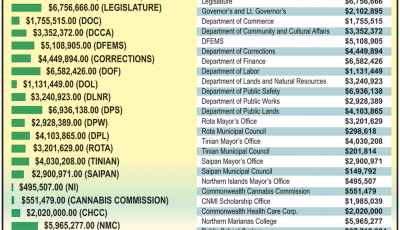‘Defendant charged with child abuse or neglect not entitled to jury trial’
Superior Court Associate Judge Joseph N. Camacho yesterday ruled that a defendant facing a child abuse or neglect is not entitled to a jury trial but only a bench trial.
In denying defendant Jesse Billy Mailuw Jr.’s request for a jury trial, Camacho said the maximum penalty for child abuse or neglect under the law does not entitle a defendant to a jury trial.
The judge said the law states that if a person is charged with a crime that is punishable by more than five years imprisonment or $2,000 fine or both, then that person is entitled to a jury trial.
Camacho said a person convicted of child abuse or neglect may be punished by imprisonment for not more than five years imprisonment, a fine of not more than $2,000, or both.
Camacho said the law also states that the court may, upon conviction, order that the person be provided with appropriate counseling to cure, alleviate or prevent psychological problems that are judged to be related to the child abuse incident.
The judge noted that by including counseling, the Commonwealth Legislature is acknowledging that, often defendants in child abuse or neglect cases may be better served by learning parental skills or anger management to cure the root cause of the abuse or neglect.
“The law as written does not entitle the defendant to a jury trial for the charge of child abuse or neglect,” Camacho said.
Last April, police arrested the 40-year-old Mailuw for allegedly burning papers, throwing $250 in a fire, and threatening to burn his family at their residence in Koblerville Turnkey Housing.
The Office of the Attorney General charged Mailuw with disturbing the peace, assault, and child abuse or neglect.
According to Police Detective Peter A. Aldan in his report, Mailuw got mad of the mess in the room of his 15-year-old daughter.
Mailuw threatened that if he comes back in 10 minutes, he was going to burn his daughter’s room and clothes.
As Mailuw was talking with his wife in the living room, he started to get mad, burned some papers, and threw them at her wife’s chest while she was carrying their infant baby.
Mailuw threatened his wife that he’s going to burn all of them in the house.
Mailuw, through counsel assistant public defender Michael Sato, requested for a jury trial. Sato argued that the child abuse or neglect charge entitled him to a jury trial.
The crux of defendant’s argument is that, since the punishment for child abuse or neglect may include court-ordered counseling upon conviction, that this exceeds the threshold sentence.
The government, through assistant attorney general Shannon Foley, opposed the motion. She argued, among other things, that the counseling mentioned in the law is a “permissible condition that does not pose additional restrictions on the defendant’s freedom.”
In denying the defendant’s motion, Camacho said by allowing counseling as part of the sentence for child abuse or neglect, the Legislature is focused on rehabilitative sentencing options without requiring a suspended sentence.
Camacho said allowing counseling in child abuse or neglect cases without a suspended sentence allows the court to address the individual needs of each case.
Camacho noted that by its nature, child abuse or neglect is a crime that involves family members.
The judge said traditional punishment for convicted criminal defendants involving incarceration, retribution, or deterrence may not be able to give defendants the necessary skills needed to prevent child abuse or neglect.
Camacho said if the Legislature had intended to mandate a jury trial for the offense of child abuse or neglect, as Mailuw argues, the Legislature could have simply worked within the framework of the law and crafted a sentence such as “not more than five years and one day, or not more than $2,001, or both.”



























